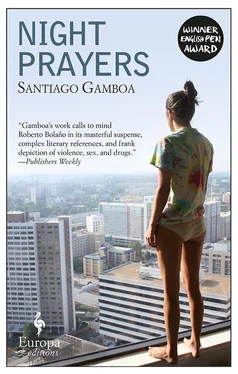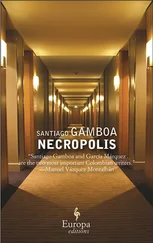Do you know someone named Manuel Manrique who studied philosophy at the National University? He’s twenty-seven now. He may have finished three or four years ago. I’ll tell you why later.
For a while I looked at the Chao Phraya, its brown waves, the canoes and sampans taking the tourists across, the oily reflections of the sun. The river moved at a thick crawl. The water wasn’t clear. Something painful seemed to flow in it.
Much to my surprise, Gustavo’s answer arrived immediately, what time was it in Colombia? barely midnight of the day before.
Gustavo said:
Yes, I knew a Manuel Manrique. He was a postgraduate student of mine at the National four years ago. A shy boy, rather quiet. Very intelligent. He was very interested in literature and films, and in the image. That’s why he was studying Deleuze. I remember talking to him about the poetics of Rimbaud, and about Godard and Bergman. I was struck by how thin he was. He looked like something out of a painting by El Greco or a sculpture by Giacometti. With a gleam in his eyes, as if he was on the verge of asking something urgent and sensitive, but which he never managed to ask. He finished his postgraduate studies and I never saw him again. Let me make some inquiries and see if I can find out anything else. Have you met him? Is he in India? Let me know.
I wrote back:
I haven’t seen him yet, but he’s in prison in Bangkok. Pills. Don’t tell anyone, this is confidential. I’m trying to find out who he is, because I have to deal with the case. Ask what circles he moved in, who he mixed with. We have to handle this with caution. I don’t know if his family has been informed.
All the best.
I kept searching. What the hell had a philosopher come to Thailand for? At first glance, I couldn’t believe he might be guilty. I remembered the prosecutor’s advice, that I should look at temples. Nothing could have been farther from the way I felt, but I decided to go out anyway. Better not to be seen spending too much time in the bar, this was a business trip, and I had to stay for a few days. It wasn’t at all unlikely that the prosecutor was investigating me, even spying on my movements at that very moment, obsessed as he was with protecting his country from undesirable elements. I went out.
It was hot on the street and I hailed a taxi.
“Bangkok Central,” I said.
I stopped near a commercial area and started walking aimlessly. Before long, I came to a hotel, and I went in and headed for the bar. The light was pleasant there. I ordered a gin and tonic and got down to business. Deleuze. University of Vincennes. It rang a bell.
Years earlier, when I was a correspondent for the newspaper El Tiempo in Paris, the French writer Daniel Pennac, in an interview, had told me that he had been a pupil of Deleuze at the University of Vincennes and that in his classes, where political and aesthetic issues were hotly debated, Deleueze had decreed the death of the novel. But Pennac had in his bag, well hidden, the recently published translation of The Green House by Mario Vargas Llosa. If they had discovered him he would have been the laughingstock of the year, but he couldn’t wait to lock himself in the bathroom and carry on reading.
Later, still in Paris, it had fallen to me to write about the suicide of Deleuze. He had jumped from the balcony of his house onto Boulevard Neil. Another “nonfigurative” death, like that of the young girl the prosecutor had told me about. Deleuze was ill and the pain had become unbearable. If I remembered correctly, it was a respiratory illness, perhaps emphysema. I took out my laptop and searched my files. The article was there, dated November 1995. I reread it:
DEATH OF A PHILOSOPHER
Paris
In despair thanks to a progressive respiratory infection, the French philosopher Gilles Deleuze dragged himself to the window of his house in the seventeenth arrondissement of Paris and threw himself out, bringing to an end seventy years of life and philosophy. The last journey of this nomad lasted barely a few seconds, crossing the air until he slammed into the sidewalk of Boulevard Neil and lay there in the cold, at eight in the evening. Passersby gathered around the body and minutes later an ambulance carried it to hospital, where he died. It is unlikely that those who tried desperately to save his life knew that in that bruised body lay one of the most unorthodox thinkers of the century, the great agitator of the University of Vincennes in the 1970s, author of such key works as Anti-Oedipus and A Thousand Plateaus , the thinker whom Michel Foucault called “the only philosophical mind in France.”
He was born in Paris on January 18, 1925, and his life was spent in classrooms and cafés. He entered the Sorbonne in 1944 and from 1948 worked as a teacher in various places, a high school in Orléans, another in Amiens, until he obtained a professorship in Lyons in 1964, and finally arrived in Paris in 1968, at the University of Vincennes, where he left his mark on a whole generation that experienced May ’68 alongside him and remained in a state of permanent revolt. Those who were his pupils remember his classes as veritable explosives launched against morality and tradition. The young women who began the year in patent leather shoes and tartan skirts ended it converted into agitators for free love, raising their voices against the establishment and cohabiting with Palestinian guerrillas, refugees from Cyprus, rebels from Guatemala, Nigeria, or Pakistan. Deleuze was the great time bomb of Vincennes, and his classes, which ended in the neighboring bars, were aimed straight at the heart of Conservative morality. The two crucial encounters of his life took place in 1962 and 1968: the first with Michel Foucault and the second with Félix Guattari, his collaborator on much of his work.
His work began in 1953 with Empiricism and Subjectivity, where he sketched his theory of the “multiple,” and continued in 1962 with Nietzsche and Philosophy, Kant’s Critical Philosophy in 1963, and Proust and Signs in 1964. One of the characteristics of Deleuze is his rereading of classic philosophers, so that he wrote about Bergson, Bacon, Spinoza, and Leibniz, but also about Kafka, Melville, and other writers ( Essays Critical and Clinical ). Deleuze’s vision is neither conformist nor explanatory: it is a flashlight that shows us something previously unseen, that tries to clarify a moment. It is difficult to grasp the work of Deleuze as a totality, since it encompasses cinema, literature, history, science, music, daily life, politics… Everything.
After the death of Michel Foucault from AIDS in 1984, that of Louis Althusser in 1990 after being confined to a psychiatric hospital for strangling his wife, and the suicide of the situationist Guy Debord, the death of Gilles Deleuze brings the Parisian school of philosophy to a tragic end, establishing a macabre statistic. The ideas nevertheless remain, resting on this definitive assertion by Michel Foucault: “One day, perhaps, the century will be Deleuzian.”
I read it twice.
I was surprised to realize how much I’d known about Deleuze at the time. I’d never been comfortable with abstract thought, and most likely I’d turned to Gustavo for help, but I can’t remember now. Nor can I explain how it was that it was published in the section Life Today , because the article isn’t exactly exciting from a journalistic point of view.
It was time to get moving, so I went back out on the street. Night was falling.
I walked aimlessly until I saw, on an upper floor, a sign that read “Bangkok Rare Books.” I went in without thinking. They had travel books from the beginning of the twentieth century and a literature section with editions of Graham Greene for $850. I passed my hand over the spines of The Power and the Glory , Heinemann, London, 1940, and The End of the Affair , Heinemann, London, 1951.
Читать дальше












